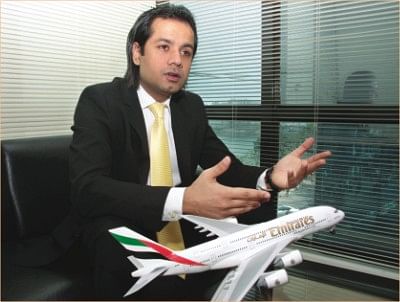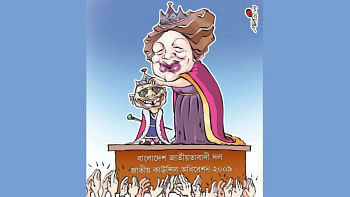Emirates jovial with Bangladesh prospects

Emirates Airlines sees good business opportunities for the aviation sector in Bangladesh thanks to its widening middle class, increasing links with the global economy and a rising number of holiday travellers.
“We see a good prospect for the sector as the country's economy is growing at around 6 percent in the last couple of years,” says Satish Sethi, country manager of Emirates Bangladesh.
"The number of people in the middle class bracket is increasing. Bangladesh has maintained remarkable apparel export growth and is getting more connected with the global economy. As a result, the frequency of air travel will increase further."
"When the economy of a country grows, air travel becomes more affordable for the people," he told The Daily Star in an interview recently.
Emirates began its journey in October 25, 1985, and started operations in Bangladesh a year later with two flights a week using Boeing 737s. Dhaka was the eighth destination to be added to the Emirates network. Now the airline operates 17 flights a week with over 400 seats per flight from Dhaka.
The airline is the number one carrier in the country in terms of sales volume, accounting for 24 percent of market share.
Emirates recently celebrated its 25 years of operation in the country. "These 25 years have been successful and profitable," said Sethi.
The airline operates flights eying all customer segments -- from business to the labour segment. Migrant workers account for around 20 percent of its customers.
Sethi also says the number of holiday travellers has trebled in the last couple of years in Bangladesh.
The Dubai based airline has a fleet of 162 aircraft, while two to three aircraft are being added on average every month. It now serves 116 destinations in 68 countries with a presence in every continent.
"We have a young fleet with an average age of 6.5 years. It is technologically more advanced, fuel efficient and eco-friendly," said Sethi.
As a part of its expansion strategy, Emirates has added many new routes including Tokyo, Amsterdam, Prague, Medina, Madrid, Dakar, Basra, Geneva, Copenhagen, St Petersburg and Baghdad in the last two years.
Emirates' new passenger routes of 2012 will include Rio de Janeiro, Buenos Aires, Dublin, Lusaka, Harare, Dallas and Seattle.
The airline manager says the expansion will help Bangladeshi travellers connect to world more easily.
Emirates is the world's second largest airline in available seat kilometres and is on track to become the largest airline in the world. In 2010-11, the group posted a 43 percent rise in net profit to 5.9 billion dirhams (US$1.6 billion).
Sethi says Bangladesh should focus on the development of airport infrastructure and ground handling to attract more travellers.
On government plans to set up a new airport, he says, “It is a good decision, which will spur further growth in the country. It will create a lot of competition. At the end, the customers will be benefitted.”
He says the new airport should ensure better facilities for the passengers as it will enable the country to allow more airlines to come to Bangladesh.
The airline official says Emirates charges fares in consideration of the services it offers to the customers. "We always work on a policy to provide better services so that customers get the best value for their money."
He says Emirates also plans to operate flights from Chittagong, Bangladesh's second largest city. The country manager however could not provide details.
This year, the airline carried 5,706 hajj pilgrims, rising from 4,682 last year.
Sethi said Dhaka is an important cargo destination for Emirates as well. The airline also offers visa assistance to its passengers in Bangladesh. It usually takes two to three working days to get a visa to enter Dubai.
Industry insiders say the airline carries passengers with business worth Tk 2.5 billion a month.
A round-trip Emirates flight from Dhaka to Dubai costs Tk 48, 812 in economy class and Tk 167,212 for business class.
Emirates has received more than 400 international awards in recognition of its efforts to provide unsurpassed levels of customer service.
"Our state of the art in-flight entertainment system, called ICE, has been awarded the best in the skies for many years. It features over 1,200 channels,” says Sethi.
Passengers can enjoy a wide range of quality services and products onboard, such as in-flight meals, featuring Asian specialty dishes, a wide range of video and audio channels, an extensive in-flight shopping catalogue as well as the world-class levels of service, says the manager.
He says low-cost carriers do not pose any threat to Emirates in anyway. “I do not think low cost airlines are a threat to full-fledged airlines. Rather, it creates business opportunities in the sector. It allows people, who earlier could not afford it, to fly."
"I personally welcome budget airlines to Bangladesh as the country has a huge segment of people who are cost-conscious."
As part of its corporate social responsibility, The Emirates Airline Foundation financed its own Emirates Friendship Hospital Ship. This Hospital Ship provides vital medical assistance to more than two million people living in communities isolated by the annual monsoon flooding in the most deprived regions of Bangladesh.
The foundation also funds a full-time team of doctors, nurses and support staff, plus annual operating expenses.

 For all latest news, follow The Daily Star's Google News channel.
For all latest news, follow The Daily Star's Google News channel. 



Comments